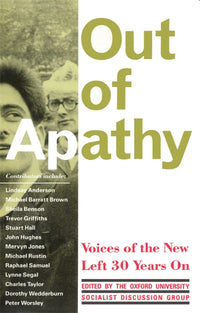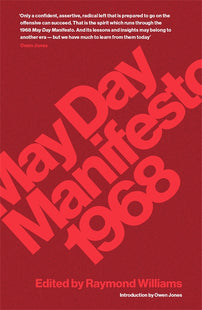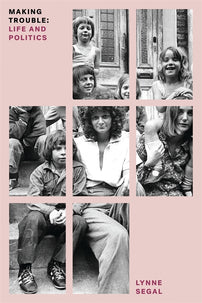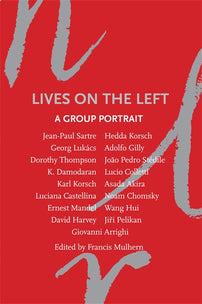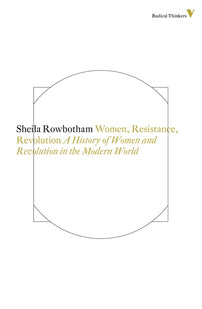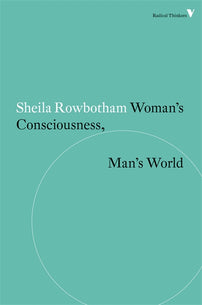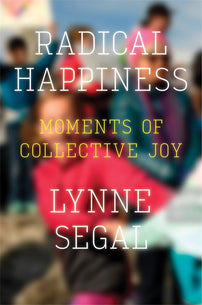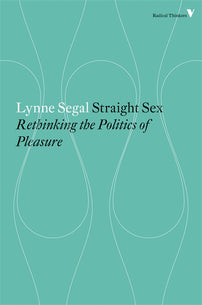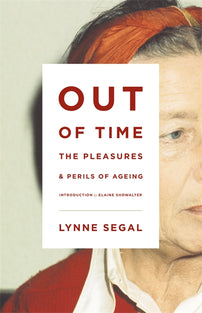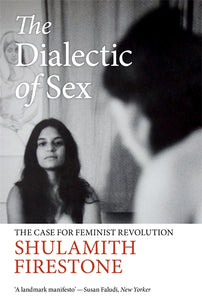Women in the New Left
Reflections by Sheila Benson, Dorothy Wedderburn, and Lynne Segal on the experiences of women within Britain's New Left.

Convened in 1987 by the Oxford University Socialist Discussion Group, the 'Out of Apathy' conference brought together a number of participants in Britain's New Left to evaluate the legacy of the project they shared in the late 1950s and 1960s. It was followed by an edited volume, published by Verso in 1989, entitled Out of Apathy: Voices of the New Left Thirty Years On, including contributions from Stuart Hall, Raphael Samuel, and Charles Taylor. A section of the book, reproduced below, collects reflections by Sheila Benson, Dorothy Wedderburn, and Lynne Segal on the experiences of women within the organizations of the New Left.
During one of the conference sessions, Jean McCrindle (former coordinator of the Scottish New Left Clubs) observed that "there was an almost pathological absence of women both in the content of the journals and of women who were writing, and that women felt almost totally silenced during that period." These comments proved provocative enough to determine the content of the ensuing discussion and also to prompt us, in collecting material for this book, to ask women who were active in the early New Left to write about their experiences.
Sheila Benson recounts her increasingly active and outspoken, but in certain respects still silent, involvement in the London New Left Club. Dorothy Wedderburn, in extracts from an interview conducted in April 1988, adds her recollections as a former member of the Communist Party who was engaged during that period mainly in CND and Labour Party campaigns. Lynne Segal's elaboration of her response to Jean McCrindle at the conference is based on her own research on the "Angry Young Men" of the 1950s. She argues that the silence of women up to the late 1960s is not surprising given the social, cultural and political context of post-war Britain.
These three pieces represent to us only the beginnings of a much needed inquiry into the history of women in the 1950s and 1960s, and more specifically the history of women in the New Left. As more women contribute to the discussion of the still problematic role of women in left theory and activism, we hope that their suggestions for change will result in the creation of a real space for women on the left.
Sheila Benson: Experiences in the London New Left
Accounts of recent history by the participants themselves are likely to be somewhat disorderly: memory may be fitful and the experience was personal as well as political, part of being young and making friends within a new kind of socialist project.
The women I came to know in the New Left were predominantly from a graduate or professionally qualified or middle-class background. I was none of these things: my origin was working-class. Although I had stayed on in the sixth form and left school with useful pieces of paper that much later allowed me to enter full-time university education, I had no such ambitions at the time: I earned my living as an invoice typist. A member of the Communist Party until about the end of 1958, I had spent 1955-56 working in East Berlin for the Women's International Democratic Federation, which comprised many nationalities and was concerned with issues ranging from basic mother-and-child health care in less developed nations to women and trade unionism in the USA and Western Europe.
By 1957 I was what was then called an "unmarried mother." Full-time work and childcare responsibilities meant limited free time. But constraints on time and energy were secondary to the financial constraints of low pay: my take-home pay in those pre-decimal days was around £8 to £9 weekly, so that even tube fares to evening events played havoc with my budget, and participation in the early days of the New Left would have been ruled out had payments for babysitting to be found. When I became the second secretary of the London New Left Club, a gay male friend and work colleague insisted he would babysit on any evening when meetings, events or administrative concerns required my presence at the Club office in Carlisle Street.
Although the role of a secretary may carry gender-stereotyped overtones, in the London New Left Club it did not include making tea or taking tickets at the door of public meetings (a responsibility of the male treasurer). It did include full membership of the executive committee. Moreover, secretarial tasks were often shared out within a general atmosphere of spontaneity and co-operation rather than any rigid division of labour.
I had never before spoken in any political forum. I still vividly recall how my first short contribution to an executive committee meeting of the New Left Club, which was taken up and seriously examined, was an important breakthrough towards a gain in confidence. When I was subsequently asked to chair or speak at public meetings, I was filled with nameless terror on each occasion. The intellectual and oratorical strengths of a number of male comrades were impressive but also intimidating. But the personal manner in which most men and women worked together, combined with occasional social opportunities to meet comrades who were also becoming friends, allowed me to begin to enter the spaces that were there to be occupied and to arrive at a small but important increase in experience. Any advance towards political confidence for women in the late 1950s and early 1960s, however halting and modest, helped to lay the foundations for a later and qualitatively different raising of consciousness.
While I want to record this positive aspect of one woman's experience in the New Left, I should add that the struggle to extend confidence, which was encouraged by most of the male comrades I saw frequently, could be set back by just one insensitive remark. After I had introduced a session on the clubs at a New Left weekend conference, for instance, a man commented (words engraved on my heart): "That was a pretty bizarre offering." I fled to the railway station. My reaction was to blame myself and disappear into a spiral of self-deprecation. Yet he had not had the slightest intention of putting me down: he simply lacked understanding of my anxiety as a speaker on public platforms.
Although I find it difficult to speak for other women comrades in the New Left - particularly without having had time for research — Jean McCrindle's reference, at the 1987 Oxford Conference, to the silence and the "almost pathological absence of women both in the content of the journals and of women who were writing" prompted me to reflect on the extent to which women participated in the London Club activities. It seems to me that the ranks of activists were made up more or less equally of women and men. There was an extensive network of women which was partly established through the existence of the London Club. The shared experience of women included much time and energy spent on the tedious administrative and organizational chores, but a number of the men voluntarily undertook or shared such tasks.
In the large public meetings, women were silent/silenced. The invited speakers and those from the audience who contributed to discussion were overwhelmingly male. It was not that women were less interested in, or lacked an informed perspective on, the topics addressed at packed and usually compelling meetings. Had we raised our hands to speak, we would not have been invisible to the man in the chair. But for women, I suspect, the sheer size of the gatherings may have been daunting. Male comrades competed to say their piece in such numbers that the chair had difficulty in fitting in all those who indicated a readiness to speak before the rent on the hall ran out. Also, some male socialists were accustomed to a style of haranguing speaker and audience that sits uncomfortably with many women. So we reserved discussion of issues for smaller, informal groups.
The New Left did not prefigure the women's movement. Although some of us were to join it, our generation was not the main force behind its rise. Whilst we were alive to racial discrimination, to Notting Hill and apartheid, we were only faintly tuned in to sexual discrimination, focusing on "double standards" and sexuality rather than structures of discrimination. Thus I have no recollection of women themselves calling into question the absence of their voices from the large public meetings. Looking back, I am interested that we were collectively inhibited, despite the fact that our ranks contained a high proportion of remarkable women whose contributions in their fields of employment gained recognition and esteem.
Why were women not on the agenda? Perhaps Robin Blackburn, at the Oxford Conference, picked out one strand when he suggested that Simone de Beauvoir's Second Sex "had a rather delayed time-bomb effect... for some reason it raised issues for people privately but not publicly." Before I got around to de Beauvoir, I read Doris Lessing's The Golden Notebook. The impact of either book on a receptive woman reader then would indeed have been subject to a time-delay: for the deeply personal was not only being published, but politicized. The Golden Notebook was the first book I had read that suggested that many of the problems' I was conditioned to think of as my own, to contend with as best I could, were in fact part of the experience of other women. I was unable fully to discuss the implications of the book until I had confronted them myself.
Second, if women were not on the agenda, culture was: the analysis of culture was a crucial part of the work of the New Left. Yet there are ways in which a concern with culture may marginalize or even obscure structural oppression. Because the immensely important project of developing the analysis of culture was undertaken by male socialists of the New Left, the focus was on male culture. As a consequence, women were marginalized in this analysis.
A third strand of explanation — probably the most important — relates to the context of the period and, more specifically, the gains for women in post-war welfare provision. The young women of the New Left generation were experiencing those gains. Women and their children now had their own right of access to a national health service and to social security. I could be both a single parent and a full-time employee because some local authorities maintained day nurseries. Other women were benefiting from increased access to higher education and the steady expansion of professional occupations. Even women following the same kind of manual or semi-skilled occupations as their mothers — the vast majority, then as now, of women in paid employment — were about to experience "the consumer revolution" and its new labour-saving domestic appliances, hire purchase, changes in retail distribution and package holidays. At the same time we all continued to respond to certain kinds of traditional stimuli important to capitalist ideology and profit — like, for instance, fashion: many of us wobbled on stiletto heels or crammed our feet into winkle-pickers and later adopted the miniskirt. If, in retrospect, the New Left has to be regarded as gender-blind, I nevertheless consider it unhistorical to blame the men of the New Left for failing to understand that the women of the New Left lived and worked within a patriarchal structure of power. We were all prisoners of history, and the women themselves were unaware of the need to challenge the assumption that women had achieved equality with men in the post-war welfare state.
Many of us stopped short for a decade or more before beginning to recognize our oppression. At the time, I existed in a state of false consciousness about my position as a woman — and this was also the case for some of the women I knew best — although I would have denied it hotly had it been put to me. For I was involved with political questions I took as urgent and compelling and was working with like-minded comrades, who also offered new and stimulating ideas.
Most importantly, the New Left seemed to be making a contribution towards breaking the fetters of Stalinist and Fabian monopolies on socialist analysis and discussion. As such it was hospitable to a heterogeneous collection of casualties from the Suez and Hungary débâcles: women and men from this and other countries, members of minority groupings. If the New Left is judged by the present generation of young socialists to have been wanting in its response to women, it still contrasts favourably with the trade-union movement and the Labour and Communist Parties of that period. The lack of hospitality of those political arenas — a combination of the bureaucratic structure of meetings, formal discourse and predominance of male voices — may have helped to account, in part, for the influx of women into the New Left.
Dorothy Wedderburn: Activism and the New Left [extracts from an interview]
I stayed in the Communist Party (CP) because most people in the Cambridge branch were critical for the same sort of reasons that I was, wanting to review a whole lot of fundamental issues, and we were able to do that together for a time. Almost as soon as I had left the CP I joined the Labour Party. Again, in Cambridge, it was a very sympathetic local Labour Party. We had in fact a very good left-wing Labour candidate who was for nuclear disarmament and all these sorts of things. So it was a natural home in which to be politically active at the local level.
I never participated in a New Left group as such. I knew about the New Left Club in London, and I knew people in it, but by that time I had become very involved with the nuclear disarmament movement, when it was still not very popular on the left. We started a group in Cambridge which antedated what became a small national movement against Britain testing its own nuclear weapons. That was my main focus of political activity from then on right the way through.
What I found appealing about the New Left was the opening up of questions. My reasons for leaving the CP did not have to do just with the horror of Hungary or the shattering of illusions about the Soviet Union, but also with the increasing dissatisfaction with the CP's policy in this country and the fundamental questioning about how we could produce social change, and so on. So the New Left, to the extent that it was opening up those sorts of questions, was very attractive.
But I wasn't attracted by what I regarded at times as the very great emphasis on theorizing and less on direct political action. I suppose the form that the theoretical discussion took did not particularly appeal to me. I was always very much concerned with the politics of getting people elected or getting policies adopted and general grass-roots political activity. I did a lot of speaking at that time for CND and its predecessors, and that took precedence over the theoretical approaches.
I don't think there was ever any deliberate exclusion of women — of course, these things are usually not deliberate: there was no attempt to exclude women. Maybe women were more diffident. Of course, one forgets how much more sensitive one is now, and it's quite hard, unless you spend a lot of time thinking about it, to reconstruct what was actually going on and how much of the assumed roles were being allocated.
I never felt that I, or women I knew, were given the organizational tasks to do, or were not expected to speak. But that is probably due to our Communist Party background, because the one thing that has been invaluable for people who were in the CP for any length of time was the kind of training you got. It was your responsibility to speak out in non-Communist Party gatherings, so you simply learned to force yourself to contribute to discussions in a way which didn't discriminate between the sexes; and that just carried over. But that is very much an aspect of intellectual, academic Communists: it was always a problem in working-class CP branches to get the women involved and to get the men to see them involved in an equal way. The attitude of working-class men to women's participation was very often discussed in the CP, but it was taken for granted that one was equal in the academic milieu.
So the question of women's involvement is something that didn't occur to me in relation to my own role, or in relation to the activities in which I primarily engaged. But it certainly raised its head in relation to the Labour Party, where a traditional branch activity would be women doing the bazaars and the money-raising, and maybe by and large not the speaking — although you'd certainly have to put exceptions to that, of course. Again this was seen by people like me and my contemporaries as a problem — but not for us, as it were. It was a problem because of attitudes which were not held among intellectuals. So I was a bit surprised that it was so apparent to people like Jean McCrindle, after the event: that she saw this relegation of women.
Also I don't think there was a feeling that certain things were "women's concerns" in the milieu in which I was moving in Cambridge at that time. That's illustrated by the amount of public speaking we did, although not necessarily at a national level. But, for example, in CND I spoke at a lot of public meetings in East Anglia; also for the Labour Party, I would talk about economic policy — and I don't think that's particularly a "women's thing." In CND there was sometimes a bit of a labelling because, particularly on nuclear testing, there was a big campaign about the dangers of fallout; and so there were particular meetings for women. And I think I'm right in saying that probably the speakers would all have been chosen as women then. That was perhaps appealing to the audience.
Thinking about how few women were contributing to the New Left journals, I was struck by the fact that in so far as the women writing for the journals were in fact all academics, and at that time the proportion of women going to university was much lower than it is today, the low number of women contributors was reflecting the sex structure in the universities. This may help, in part, to explain it. There was no issue of principle involved in the fact that I did not write for Universities and Left Review or New Left Review — that I was asked and refused, or anything like that. But what I was writing and thinking about — and this also applies to my contribution to the May Day Manifesto — was very much linked with my own interests and research in poverty, inequality, and social policy, and my memory is that these journals didn't carry an awful lot on those subjects: they had much more theoretical interests.
Lynne Segal: The Silence Of Women in the New Left *
Looking back today, Jean McCrindle commented, women's silence seems quite incredible, almost pathological. But if we look at the experiences and assumptions surrounding women's (and men's) lives at the time, the silence is not so surprising.
The first clue to this pathological silence of, and about, women in those days is that the left in the fifties was as silent as everyone else on relations between the sexes because it accepted unquestioningly a belief central to the fifties consensus: women's problems had been solved. In fact, the myth that women's problems were a thing of the past, that the sexes were now equal, was as central to the post-war consensus as the supposed disappearance of class antagonism.
The second clue is the force of the assumed biological imperative of motherhood and childcare which emerged more strongly in the fifties than it ever had before. Every social problem, the psychological wisdom of the time insisted, could be attributed to inadequate mothering. The prevalent assumption then was that if women with children had jobs, it was because they were "forced to" through poverty. Mothers would not choose to work. Woman's place was so absolutely in the home that women were no more able than men at the time to question domestic arrangements and to suggest any alternative solutions to the strains placed upon women isolated in the home or, increasingly, going out to work but expected to give complete priority to their families. What was needed was a whole new way of thinking about marriage, child-rearing, sexuality, and employment, and that just wasn't available either to women or to men at the time.
A third point is that although in the fifties the woman's place was in the home, the consensus at the time assumed that women could hardly have cause to complain of this — for now the man's place was also in the home. Men too, in popular consciousness, were being domesticated, had returned from battlefield to bungalow with new expectations of the comforts and pleasures of home. Almost all the writing of the fifties celebrates a new togetherness, harmony, and equality between women and men in the home. But the man-about-the-house still occupied a separate sphere from women — even in the home. He did the gardening and all manner of do-it-yourself hobbies: he didn't change the nappies, do the housework; this was not his job. Again expert opinion suggested that the man-in-an-apron could cause psychological damage to his sons by supplying an inadequate sex-role model.
Fourthly, it does seem to be true that the image of the domesticated male did create a lot of tension and, as some were to describe it, "crisis" over "manhood" in the fifties. This was particularly acute because of the post-war contrast between wartime and civilian life, perpetuated until the early sixties through the maintenance of universal military conscription marking men’s entry into adulthood. Certainly the bravado and male bonding of conscript life strengthened what were in fact the prevalent tensions and conflicts between men and women in the fifties. No amount of celebrated togetherness' between the sexes could really hide the fact that the fifties, still without abortion or contraception rights for women, was a time of enormous mistrust and hostility between women and men. Woman-hating, homophobia, and men's fear of their own "weakness" or "femininity" constituted the hallmark of fifties masculinity. The ongoing dismantling of the "British Empire" and the Cold War climate both exacerbated national anxieties over manhood and fears of national weakness and decline at the time. A sex war, and hysterical persecution of gay people, accompanied the Cold War.
Finally, taking us right into the heart of the New Left and the silence of and about women at the time, was the impact of the so-called "Angry Young Man" on radical culture and politics in the fifties. Women and domesticity were seen as the archenemy of the freedom-loving anarchic young working-class rebel of the day. Men of the New Left identified strongly with the tough, amoral, cynical, invariably misogynist heroes of Allan Sillitoe, John Osborne, and others. Women were never to be trusted but treated as part of the system trying to trap, tame, and emasculate men. A stifling domesticity had killed the spirit and guts of men, these rebels' declared, and women were to blame. What was really happening in most of the "Angry" literature was that class hostility was suppressed and twisted into new forms of sexual hostility.
Amidst all this taunting and blaming of women, amidst the general blindness — of men and women alike — to any issues of gender or problems of women, it seems to me not very surprising that so few women were writing or speaking publicly and prominently at the time. The wonder is more that in ten short years we were to become so confidently vociferous. Things really did change — but that is another story.
*The themes and ideas expressed in this article are further developed in: L. Segal, "Look Back in Anger: Men in the Fifties," in Male Order, ed. Rowena Chapman & Jonathan Rutherford, London 1988.
[book-strip index="1" style="display"]